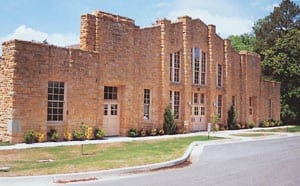Civil War Encampment at the Museum
The Old Independence Regional Museum will host a Civil War encampment on the museum grounds this Friday and Saturday, October 29-30. Visitors are invited to participate as living historians demonstrate various aspects of living in a Confederate camp during the Civil War.
Presented by the Pvt. Job S. Neill Camp #286 of the Sons of Confederate Veterans, this living history event will feature soldiers’ campsites with tents and cooking over an open fire, a covered wagon, blacksmithing, and lessons on historic medicines. Reenactors will demonstrate what day-to-day life was like for a soldier in Arkansas.
As a prosperous town strategically located on the White River, Batesville was occupied by both Confederate and Union forces over the course of the war. The land where the museum now stands was a Civil War campsite.
The camp will set up after noon on Friday and will be open to the public until 7 p.m. The grounds will open again on Saturday morning at 9 a.m. and continue throughout the afternoon.
For more information, call 870-793-2121, email oirm.educator@gmail.com, or visit www.oirm.org. The museum is located at 380 South 9th Street in Batesville.
Old Independence serves a 12-county area: Baxter, Cleburne, Fulton, Independence, Izard, Jackson, Marion, Poinsett, Sharp, Stone, White, and Woodruff. Parts of these present-day counties comprised the original Independence County in 1820s Arkansas territory.
The museum is open Tuesday-Saturday, 9:00 a.m. to 5:00 p.m. Admission is $5.00 for adults, $3.00 for seniors, veterans, and students, and $2.00 for children 6-12. Admission for children 5 and under is free. The museum is located at 380 South 9th Street, between Boswell and Vine Streets in Batesville.
This humanities program is made possible by local support from Independence County and the City of Batesville, as well as by Challenge Grant Endowment funding from the National Endowment of the Humanities. Any views, findings, conclusions or recommendations expressed in this program do not necessarily represent those of the National Endowment for the Humanities.

Cathy Drew is a lifelong resident of the region that she loves to promote. She was born in downtown Batesville in the late ’60s, located in one of the eight counties she now enjoys encouraging people to visit.
Drew became associated with the Ozark Gateway Region in 1990 while working at the ad agency (The Media Market Inc.). The agency handled marketing for the regional association, where she and her co-workers produced an annual tabloid publication. She began working as the Ozark Gateway Region director in June 2000.
After Drew became director, she took the region to the next level by helping the tourism organization create a new website and moved it from the old newspaper paper tabloid publication to a color magazine format. She helped open a visitor center for the Ozark Gateway, allowing visitors to pick up information from the entire state 24/7. Over the years, Drew has helped the organization meet new marketing goals, such as in- and out-of-state marketing, assuring that all 100,000 copies of their magazines are distributed each year.
In 2016, she assisted in creating the first Ozark Gateway Region Golf Classic. The tournament continues to grow each year, allowing the organization to expand its co-op program and helping each county have dedicated promotion. Drew stays busy at Ozark Gateway as the ad sales manager, magazine editor, day-to-day office operations, trade show representative, and magazine distribution representative, all while ensuring that the region is represented all over Arkansas and southern Missouri.
Drew was featured in several local and statewide publications over the years, as well as the 1997 cover of the Ozark Gateway Region tabloid, along with her then 4-year-old son, Jon. She has received several awards, such as the Batesville Rotarian of the Year in 2010 and a three-time Paul Harris Fellow.
She also has served as an Independence County election commissioner for several years. She now serves as their co-election coordinator, helping with behind-the-scenes management of voting equipment, day-to-day election deadlines, and poll worker training.
Drew is Batesville Rotary Club Past President, and is the Rotary Clubs’ current membership chair.
In March of 2018, Drew was honored with induction into the Arkansas Tourism Hall of Fame for her many years of dedicated service to the tourism industry.


